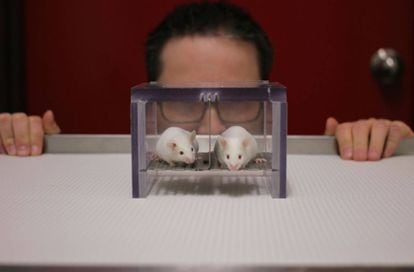A researcher observes two laboratory mice.
TUTTLE / MCGILL UNIVERSITY
One day in 2019, in South Africa, a huge elephant lunged at a group of frightened tourists. One of them was the psychologist Raül Andero. "I was completely petrified," he recalls. This freezing reaction to danger is almost universal in mammals. In his laboratory at the Autonomous University of Barcelona, he studies the effect of fear on memory using mice that are subjected to sharp beeps and small electric shocks. The longer the animals spend paralyzed when hearing the beep, the more vivid the memory of the past trauma. The ultimate goal of Andero is to modulate the memory of the mice so that fear does not paralyze them. It is the first step to achieve the same in people who suffer anxiety, trauma after an assault or an accident or phobias that prevent them from living normally.
The difference between fear and anxiety is easy for Andero to explain. Do you remember the beginning of
The Simpsons
, when Homer jumps terrified because his family is going to run over him with the car? That is fear because there is a real threat. Anxiety is a very similar feeling, only that the threat may or may not come. In fact, in most cases it never materializes ”, he sums up.
"Women suffer much more anxiety, pathological fear and post-traumatic stress than men," explains the researcher. That's why the brutal inequality in animal studies on the subject is striking: for every neuroscience experiment that includes females, there are five others that only focus on males. And it is not just a matter of laboratories. Traditionally, there have been far fewer women than men in cardiovascular disease clinical trials. Perhaps this is why some drugs work differently, and sometimes worse, in women than in men.
Andero today signs the first study that has shown that the same compound has an opposite effect on the memory of males and females.
The molecule in question is osanetant, a drug that was developed by the French pharmaceutical Sanofi in the late 1990s to try to improve the treatment of schizophrenia.
It was never marketed because it barely provided benefits compared to the usual medication.
"We do not want to erase people's memory, but to modulate a traumatic memory to transform it into a normal fear that does not paralyze the person and can live with it"
Raül Andero, researcher at the Autonomous University of Barcelona
Andero's team is studying this drug because it can modulate memory;
in particular the bad memories.
What his study, published this Monday in
Nature Communications
, is that male mice that take it lose their fear at the memory of a negative experience - the beeping and the electric shock - and do not freeze.
The effect on females is the opposite: the memory becomes more intense and they spend more time paralyzed with fear.
"This is proof that the same drug can have opposite effects," Andero highlights.
"If we take into account that for decades drugs have been developed using only male animals, the logical thing is to think that in the pharmacy there are drugs that can have different or even opposite effects by sex, although it has not been proven," he highlights.
This study is a wake-up call to the lack of gender parity in basic science and also in clinical trials with people. “Since you are a doctoral student, they tell you that females are more variable, partly due to the menstrual cycle and hormones. It is a mantra that is not true, as there are studies that have shown a great variability of behavior also in males. All the neuroscience that we know focuses on the male brain ”, highlights Andero.
His team is already preparing an experiment in people. "With the saliva sample of people who do a conditioned fear task, similar to that of mice, we analyze genetic variations of the Nk3 receptor on which this drug acts," the psychologist details. "The hypothesis is that certain genetic variations of Nk3 in men and women can predict whether or not the drug will work to modulate memory," he adds. It is a first step towards personalized medicine in mental illness. "A recent study has shown that a similar system can predict whether someone will suffer from this disorder after trauma within a year," explains Andero. "We do not want to erase people's memory, but to modulate a traumatic memory until it becomes a normal fear that does not paralyze the person and can live with it," he concludes.
"Studies like this make clear the usefulness of stratifying studies and clinical trials by sex," says María Teresa Cantero, professor of preventive medicine at the University of Alicante who for years has studied the lack of women in clinical trials and the different effects between sexes of many drugs.
"Historically there is an imbalance on this issue that runs through all science, from the most basic to clinical trials in the last phases," he highlights.
You can follow MATERIA on
,
and
, or sign up here to receive
our weekly newsletter
.






/cloudfront-eu-central-1.images.arcpublishing.com/prisa/5TJR5HS6ZRH2JMMARS3NZA53JE.JPG)


